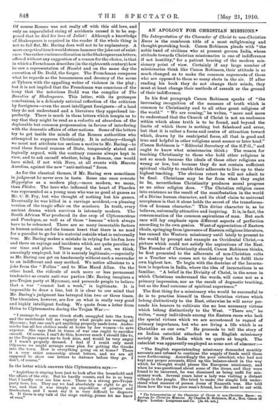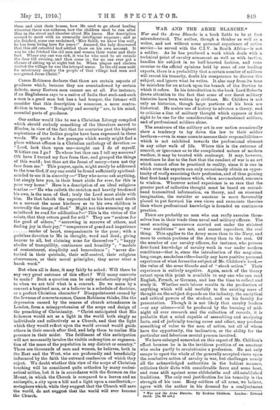AN APOLOGY FOR CHRISTIAN MISSIONS.*
The Interpretation of the Character of Christ to non-Christian Races is the cumbrouts title of a most enlightening and thought-provoking book. Canon Robinson pleads with " the
noble band of civilians who at present govern India, whose attitude towards Christian missionaries is one of indifference if not hostility," for a patient hearing of the modern mis- sionary point of view. Certainly if any large number of missionaries think like Canon Robinson, their attitude is so much changed as to make the common arguments of those who are opposed to them so many shots in the air. If after reading his book they do not change their minds, they must at least change their methods of assault or the ground of their indifference.
In his first paragraph Canon Robinson speaks of "the increasing recognition of the measure of truth which is common to Christianity and to all other great religions of the world." " We are coming," he writes, " more and more to understand that the Church of Christ is not an enclosure within which alone truth is to be found, and beyond the limits of which there is nothing but falsehood and error, but that it is rather a focus and centre of attraction toward which, drawn by its centripetal force, all that is good and true and helpful in other religions must sooner or later tend." (Canon Robinson is "Editorial Secretary of the S.P.G.," and ought to know what missionaries think.) The reason for teaching Christianity to those who hold other religions is not so much because the ideals of those other religions are wrong or low, but because they do not contain sufficient spiritual vitality to enable their adherents to live up to their highest teaching. The obvious retort he will not admit to be final. Christians may be far from what they ought to be, nevertheless Christianity produces moral progress as no other religion does. " The Christian religion came into existence as the result of the manifestation in the world of a Divine human character, and its chief claim to universal acceptance is that it alone holds the secret of the transforma- tion of human character." This divine character is, as be believes, universally attractive and inspiring. It is, in fact, the consummation of the common aspirations of man. But each race will lay emphasis upon different aspects of perfection according to its own genius. Want of appreciation of Eastern ideals, springing from ignorance of Eastern religious literature, has caused the Western missionary until lately to present to the world by precept and example an Occidental Christ,—a picture which could not satisfy the aspirations of the East. The Founder of Christianity should, Canon Robinson thinks, be first presented to the adherents of non-Christian cults as a Teacher who comes not to destroy but to fulfil their own highest law. To begin with the doctrine of the Incarna- tion is hopeless in India, where the idea of incarnations is so familiar. "A belief in the Divinity of Christ, in the sense in which Christians understand the words, will come not as a primary impression, nor as the result of dogmatic teaching, but as the final outcome of spiritual experience."
The first thing for a missionary who would be successful to do is to practise himself in those Christian virtues which belong distinctively to the East, otherwise he will never per- suade his hearers to cultivate the no less necessary virtues which belong distinctively to the West. "There are," he writes, "many individuals among the Eastern races who lack the special virtues which we are accustomed to regard of primary importance, but who are living a life which is as Christlike as our own." He proceeds to tell the story of an Indian catechist attached to an English missionary society in North India which we quote at length. The catechist was apparently employed as some sort of almoner :—
" The English superintending missionary demanded monthly accounts and refused to continue the supply of funds until these were forthcoming. Accordingly the poor catechist, who had not kept any proper accounts, filled up the balance-sheet in the way which he thought would please the European missionary, and when he was questioned about some of the items, and they were found to be incorrect, he was dismissed as being unfit for mis- sionary work. Several years later a lady was visiting a distant village in the jungle. She tried to make the simple folk under- stand what manner of person Jesus of Nazareth was. She told them how He was the poor man's friend, how He used to eat. with • The Interpretation of the Character of Christ to non-ChriaHan Races: an Apology for Christian Missions. By Charles H. Bobinson, M.A., Hon. Canon el ItiRon. London: Longmanand Co. [Sa. 6d. net.] them and visit their homes, how He used to go about healing wherever there was sickness, how the children used to run after Him in the street and clamber about His knees. Her description seemed to meet with an unusually intelligent response ; and as she finished, some one exclaimed, 'Miss Sahib, we know him well he has been living here for years !' Amazed, the lady discovered that this old catechist had settled there on his own account. It was he who fetched the old men and women their water and their fuel. Where any one was sick, it was he who used to sit outside the door till evening, and then come in ; for no one ever got a chance of sitting up at night but he. When plague and cholera visited the village he was the intrepid nurse. In the old man unfit for missionary employ the people of that village had seen and recognised Jesus Christ."
Canon Robinson declares that there are certain aspects of goodness which, because they are overshadowed by certain defects, many Eastern men cannot see at all. For instance, if an Englishman says to a native of India that such-and-such a man is a good man but has a bad temper, the listener will consider that this description is nonsense, a mere contra- diction in terms. " Benignity and serenity " are, to his mind, essential parts of goodness.
Our author would like to see a Christian Liturgy compiled which should embody something of the literature sacred to Hindus, in view of the fact that for centuries past the highest aspirations of the Indian peoples have been expressed in these
words. We quote a, few passages which surely might find a place without offence in a Christian anthology of devotion :— " Lord, look thou upon me—nought can I do of myself. Whither can I go P To whom but thee can I tell my sorrows? Oft have I turned my face from thee, and grasped the things
of this world ; but thou art the fount of mercy—turn not thy face from me." This prayer, again, might surely be addressed to the true God, if any one could be found sufficiently spiritual- minded to use it in sincerity :—" They who never ask anything, tut simply love yon, in their heart abide for ever, for this is your very home." Here is a description of an ideal religious teacher :—" He who calleth the stricken and heavily burdened his own, is the man of God; truly the Lord must abide with him. He that taketh the unprotected to his heart and doeth to a servant the same kindness as to his own children is assuredly the image of God." Might not this summing up of sainthood be read for edification?—" This is the virtue of the saints, that they return good for evil." They are " zealous for the good of others," "sorrowing in sorrows of others, and finding joy in their joy," " conquerors of greed and impatience
tender of heart, compassionate to the poor; with a
guileless devotion to Me in thought, word and deed; giving honour to all, but claiming none for themselves " ; "happy abodes of tranquillity, continence and humility "; "models of contentment, simplicity and benevolence " ; "never dis- turbed in their quietude, their self-control, their religious observances, or their moral principles; they never utter a harsh word."
But when all is done, it may fairly be asked: Will there be any very great outcome of this effort ? Will many converts be made ? Such a question can be only satisfactorily replied
to when we are told what is a convert. Do we mean by a convert a baptised man, or a believer in a schedule of doctrine, or a perfect Christian character P Disappointment caused by the fewness of converts comes, Canon Robinson thinks, like the depression caused by the census of church attendances in
London, from a misapprehension of the scope and design of the preaching of Christianity. " Christ anticipated that His
followers would act as a light in the world both singly as individuals and collectively as a Church, and that the light which they would reflect upon the world around would guide others in their search after God, and help them to realise His presence in their midst. The fulfilment of this anticipation will not necessarily involve the visible redemption or regenera- tion of the mass of the population in any district or country." There are thousands of men and women, he believes, both in the East and the West, who are profoundly and beneficially influenced by the faith the outward confession of which they reject. We doubt whether this view of the scope of Christian teaching will be considered quite orthodox by many ecclesi- astical critics, but it is in accordance with the Sermon on the Mount, in which the Church is compared to a leaven and an antiseptic, a city upon a hill and a light upon a candlestick,— metaphors which, while they suggest that the Church will save the world, do not suggest that the world will ever become the Church.







































 Previous page
Previous page